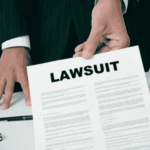Mold exposure in rental properties can lead to serious health risks, including respiratory problems, allergies, and even long-term illnesses. If your landlord has failed to address a mold problem in your home, you may be wondering: Can you sue a landlord for mold exposure?
The answer is yes, but success depends on various factors, including local laws, lease agreements, and evidence of negligence. In this comprehensive guide, we’ll explore your legal rights, how to prove liability, and steps to take if you decide to pursue legal action.
Understanding Mold and Its Health Risks
Mold is a type of fungus that thrives in damp, humid environments. Common household molds include:
- Black mold (Stachybotrys chartarum) – Known for its toxic effects
- Aspergillus – Can cause lung infections
- Cladosporium – Triggers allergies and asthma
Health Effects of Mold Exposure
Prolonged exposure can lead to:
- Chronic coughing and wheezing
- Skin rashes
- Headaches and fatigue
- Severe respiratory infections (in immunocompromised individuals)
If you or your family experience these symptoms, mold could be the culprit.
Landlord Responsibilities for Mold Remediation
Landlords are legally obligated to provide a safe and habitable living environment under the implied warranty of habitability. This includes addressing mold issues caused by:
- Leaky pipes or roofs
- Poor ventilation
- Water damage from floods
When Is a Landlord Liable for Mold?
A landlord may be held responsible if:
- They knew (or should have known) about the mold but failed to act.
- The mold resulted from their negligence (e.g., ignoring water leaks).
- Local laws specifically require mold remediation (some states like California and Texas have strict mold laws).
However, if the mold was caused by a tenant’s actions (e.g., not reporting a leak, poor cleaning habits), the landlord may not be liable.
Can You Sue a Landlord for Mold Exposure?
Yes, you can sue, but success depends on:
1. Proving Landlord Negligence
You must show that:
- The landlord was aware (or should have been aware) of the mold.
- They failed to take reasonable steps to fix it.
- The mold caused verifiable harm (health issues, property damage).
Evidence to collect:
- Photos/videos of mold growth
- Medical reports linking symptoms to mold
- Records of complaints to the landlord
- Inspection reports from mold specialists
2. State and Local Laws
Some states have specific mold laws:
- California (Toxic Mold Protection Act) – Requires landlords to disclose mold hazards.
- Texas – Sets permissible mold exposure limits.
- New York – Requires landlords to maintain mold-free properties.
Check your local housing codes to see if mold is explicitly covered.
3. Lease Agreement Clauses
Some leases include mold addendums stating:
- Tenant responsibilities (e.g., reporting leaks promptly).
- Landlord obligations for remediation.
If the lease requires the landlord to handle mold, violating this could strengthen your case.
Steps to Take Before Suing Your Landlord
1. Notify Your Landlord in Writing
Send a formal letter (via certified mail) detailing:
- The mold problem
- Health effects experienced
- Request for immediate remediation
Keep a copy for your records.
2. Document Everything
- Take timestamped photos/videos.
- Keep medical records linking symptoms to mold.
- Save all communication with the landlord.
3. Hire a Professional Mold Inspector
A certified inspector can:
- Confirm mold presence.
- Identify the cause (landlord neglect vs. tenant actions).
- Provide an official report for court.
4. Consult a Tenant Rights Attorney
A lawyer can help you:
- Determine if you have a strong case.
- File a lawsuit in small claims or civil court.
- Negotiate a settlement with the landlord.
Possible Legal Outcomes
If you sue, you may be entitled to:
✅ Financial Compensation – For medical bills, property damage, and pain/suffering.
✅ Lease Termination – If the property is uninhabitable.
✅ Mold Remediation – Court-ordered repairs.
Types of Lawsuits You Can File
- Personal Injury Claim – If mold caused health issues.
- Breach of Warranty of Habitability – For uninhabitable living conditions.
- Retaliation Lawsuit – If the landlord evicts you for complaining.
How to Prevent Mold in Your Rental
While legal action is an option, prevention is better:
✔ Report leaks immediately.
✔ Use dehumidifiers in damp areas.
✔ Ensure proper ventilation (especially in bathrooms).
✔ Regularly clean mold-prone areas (e.g., showers, basements).
Final Thoughts: Should You Sue?
If your landlord ignored mold complaints, leading to health problems, you have the right to sue. However, lawsuits can be time-consuming and costly. Consider:
- Mediation – A neutral third party helps negotiate a solution.
- Local Housing Authorities – File a complaint for an official investigation.
- Moving Out – If the landlord refuses to fix the issue, breaking the lease may be an option.
For legal advice tailored to your situation, consult a tenant rights attorney.
Need Help with Mold Issues? Contact Uorni Today!
At Uorni, we help tenants understand their rights and fight for safe, mold-free housing. If you’re dealing with a negligent landlord, reach out for expert guidance.
Got questions? Leave a comment below or contact us for a free consultation! Got questions? Leave a comment below or contact us for a free consultation!


